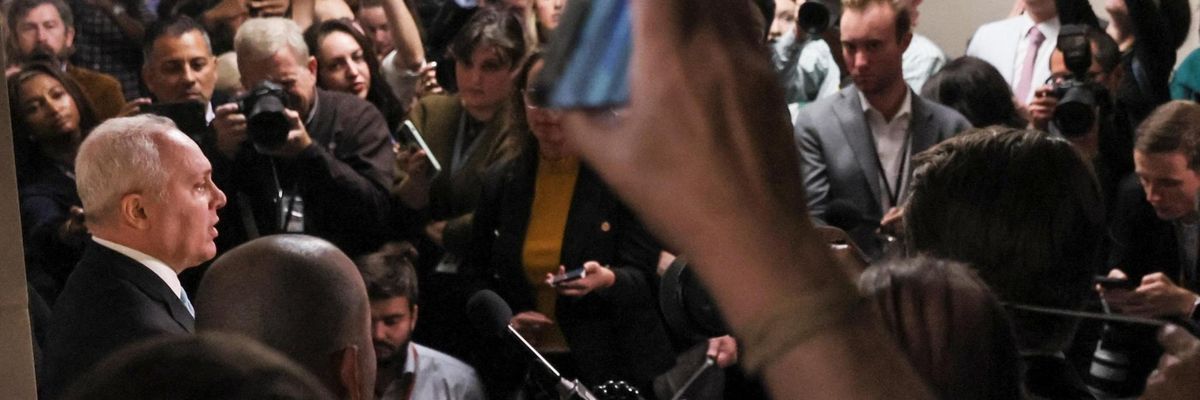Despite a chilly reception from Republicans on Capitol Hill this week, President Joe Biden is reportedly planning on moving forward with his proposal to combine aid for Ukraine and Israel—along with funding for other policies—into a single package.
The White House’s emergency supplemental request for Ukraine has been hanging in the balance since August, languishing in Congress as House Republicans deal with internal chaos and opposition to further funding of Kyiv has been growing among GOP members.
The question of future aid to Ukraine has been central in House debates over the last month; first, in the battle over continued funding of the U.S. government; and subsequently in the dispute that resulted in the removal of Kevin McCarthy from his position as Speaker.
In an effort to potentially get around these roadblocks, the Biden administration has been weighing combining that aid with funding for Israel, Taiwan, and border security.
Providing funding for Israel in the aftermath of Hamas’ shocking attacks over the weekend will likely garner nearly unanimous support from Congress. As Responsible Statecraft noted on Monday, an emergency package for Israel would “likely sail through Congress, observers say, with or without a House Speaker.”
The White House is likely hoping that the speed with which legislators will want to pass aid for Israel will push enough Republicans to put their reluctance to supporting more funds for Kyiv to the side. Such a “move could make sense because it ‘jams the far right,’” ias an anonymous senior administration official told the Washington Post earlier this week.
Biden’s planned proposal has received explicit support from some prominent House Republicans, including the chairman of the House Foreign Affairs Committee, Rep. Michael McCaul (R-Texas), a strong supporter of continued funding for Ukraine. “There’s discussion about putting Israeli funding with Ukraine funding, maybe Taiwan funding and finally border security funding,” McCaul said Monday. “To me that would be a good package.”
The important question is how Republican members who are skeptical of funding Ukraine’s war effort will react. After successfully managing to remove $300 million in aid from the Defense Department’s Appropriations Act last month, some GOP lawmakers insist that they will continue to oppose support for Kyiv, even if it is tied to aid for Israel.
“They shouldn’t be tied together. I will not vote to fund Ukraine. Absolutely not,” said Rep. Marjorie Taylor Greene (R-Ga.), one the staunchest opponents of Ukraine aid in the House. “Israel is totally separate.”
Sen. Josh Hawley (R-Mo.) went a step further, suggesting that “any funding for Ukraine should be redirected to Israel immediately.”
Others have not gone so far as to say that they would oppose such a package if it came to a vote, but have still cautioned against combining what they see as two distinct issues.
For some Republicans, contrary to the Biden administration’s hopes, the need for swift legislation that supports Israel is precisely why it should be voted on separately.
“We’ve got to do something for Israel today if we can, or tomorrow,” Rep. Michael Burgess (R-Texas) told NBC News on Monday, whereas the conversation of future Ukraine aid is “an argument that’s in process.”
The Heritage Foundation, the influential conservative think tank that has opposed additional Ukraine aid, has made a similar case. “Lawmakers need to resist attempts to link emergency military support for Israel with additional funding for Ukraine,” the group wrote on X. “These conflicts are separate and distinct. They deserve individual debates and votes in Congress.”
Rep. Don Bacon (R-Neb.), who emphasized that it was “morally right” to help both Israel and Ukraine, added that “to hold one hostage for the other wouldn’t be right.”
Rep. Tom Cole, (R-Okla.), who supports aid to Ukraine (in a separate bill) was even more blunt, calling the move “blackmail.”
Whether or not such a package receives a vote on the House floor may ultimately come down to the future of House leadership. Supporters of Ukraine aid may have received a slight boost on Wednesday, when Rep. Steve Scalise (R-La.) edged out Rep. Jim Jordan (R-Ohio) in the Republican conference vote to become the GOP nominee to replace McCarthy. However, the vote to elect the next Speaker did not take place on Wednesday, with Scalise still reportedly short of the necessary 217 total votes to prevail as Speaker.
Jordan had earlier stated that he opposed bringing Ukraine aid to the floor, and, when asked Wednesday whether he would be in favor of tying that aid to aid for Israel, he said “We gotta help Israel that’s for sure.” Some took this response as a signal that aid to Ukraine would take a backseat to supporting Israel.
Scalise has not commented on how he would treat Ukraine funding if elected, but he has voted in favor of aid packages in the past.
- Biden readying emergency weapons aid for Israel ›
- Why Hamas attacked and what happens next ›
- Diplomacy Watch: Biden to use aid package to overcome ‘Ukraine fatigue’? - Responsible Statecraft ›
- Biden's American bedtime story falls flat - Responsible Statecraft ›
- What they mean when they say America is 'indispensable' - Responsible Statecraft ›
- Aid for Israel and Ukraine is not an American jobs program - Responsible Statecraft ›
- GOP candidates: latest US strikes in Syria not enough - Responsible Statecraft ›
- House votes to avoid govt shutdown, but no Ukraine, Israel aid - Responsible Statecraft ›
- Diplomacy Watch: Biden administration scrambles to secure more aid for Ukraine - Responsible Statecraft ›
- Is the House where Ukraine — and Israel — aid goes to die? | Responsible Statecraft ›
- Foreign aid vote shows stark generational divide in GOP | Responsible Statecraft ›
















